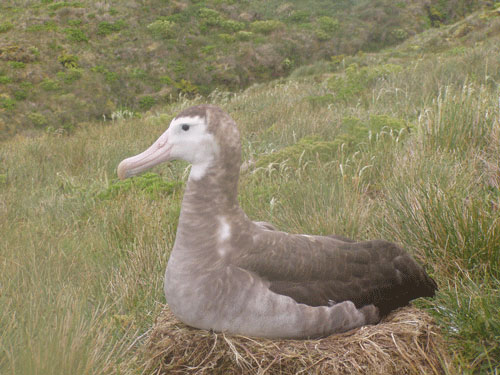The Critically Endangered Tristan Albatross Diomedea dabbenena remains under serious threat from attacks on its chicks by House Mice Mus musculus on the United Kingdom’s Gough Island in the South Atlantic. Last year was the poorest breeding year since recording commenced in 2000, with less than 10% of occupied nests resulting in fledged chicks (click here). Great albatrosses of the genus Diomedea are expected to raise chicks to fledging from 60-70% of breeding attempts, based on studies on islands where their chicks are not attacked by rodents, so conservationists are rightly concerned for the long-term future of Gough’s near-endemic albatross.
This year's January-February count of incubating birds is now complete with researchers on the island reporting to ACAP Latest News that 1886 pairs were counted for the biennially-breeding species. This figure has not as yet been adjusted to take account of the estimated numbers of nests that may have failed before the island-wide count was completed. Gough’s often poor weather with mists causing low visibility means that the island-wide survey has to take advantage of “weather windows” to get into the mountainous interior where the albatrosses breed; thus the counts often have to be spread over several weeks.

A female Tristan Albatross incubates its egg on Gough Island
Come September-October this year the number of surviving chicks will be counted to see how many have survived the winter onslaught by the predatory mice.
Click here for earlier incubation counts of Gough’s Tristan Albatrosses.
With thanks to Christopher Jones and Michelle Risi of the University of Cape Town’s FitzPatrick Institute for information.
John Cooper, ACAP Information Officer, 05 March 2015

 English
English  Français
Français  Español
Español